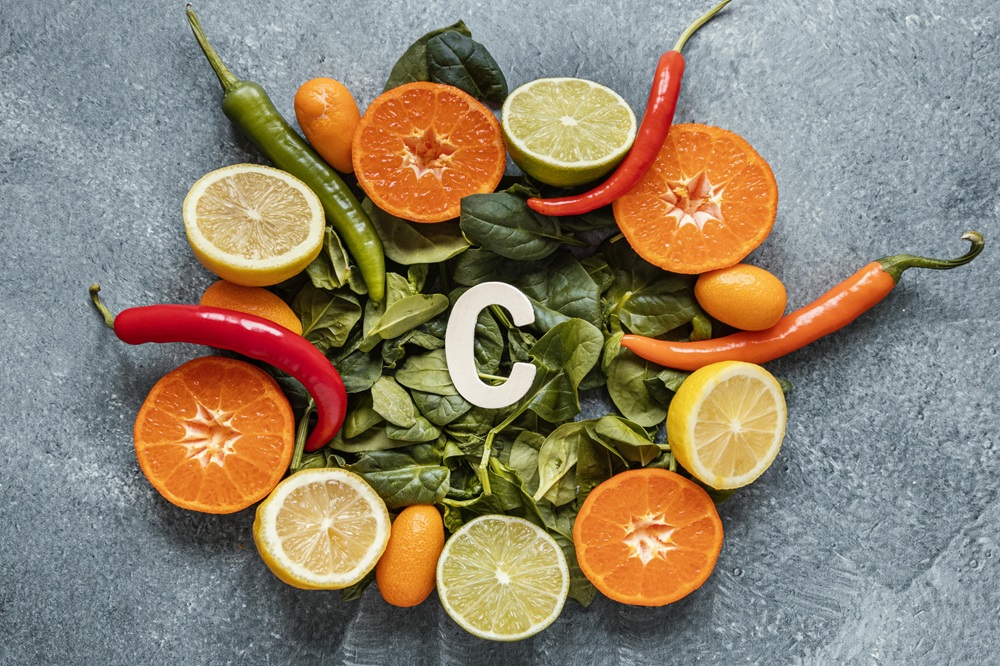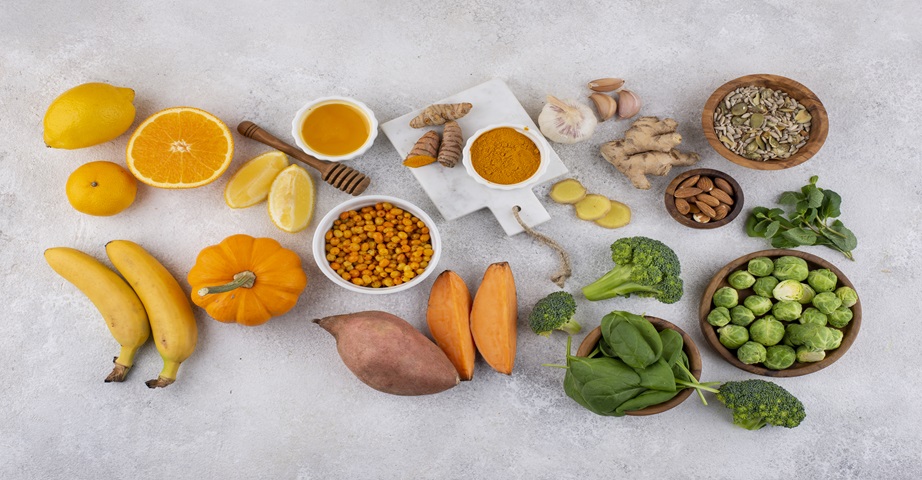What has the most vitamin C? Learn about its natural sources!

Vitamin C is a water-soluble endogenous substance that plays an important role in the human body, including supporting the proper functioning of the immune system and reducing the risk of infection. It is an ingredient often supplied to the body in the form of dietary supplements, which can also be found in many food products naturally used in the daily menu. What foods rich in vitamin C should be included in the diet? Which fruit has the most vitamin C? What vegetables are considered a fund of ascorbic acid? Synthetic or natural vitamin C - which one is better to choose?
Summary
Vitamin C – properties
Vitamin C is an essential micronutrient, the proper supply of which is necessary for the suitable functioning of the human body. It is a substance recognized as a powerful antioxidant that can fight reactive oxygen species and protect against the harmful effects of free radicals, thereby reducing oxidative stress. This, in turn, means that the compound can have a positive effect on the condition of the skin, delaying the aging process. As if that were not enough, ascorbic acid can also:
- support the optimal functioning of the immune system, reducing the risk of infection and increasing the body's immunity,
- contribute to lowering blood cholesterol,
- increase the absorption of non-heme iron,
- promote the production of hormones such as dopamine and noradrenaline,
- affect the reduction of blood sugar levels,
- reduce the risk of developing diseases of the cardiovascular system, including sealing blood vessels,
- increase bone mineralization while reducing the risk of fractures and the development of osteoporosis,
- promote the reduction of blood pressure,
- relieve a cold,
- contribute to the synthesis of collagen,
- support wound healing processes and skin regeneration,
- exhibit anti-inflammatory potential,
- reduce the risk of neurodegenerative diseases such as Parkinson's disease or Alzheimer's disease.
Sources of natural vitamin C – where to look for them?
Vitamin C, also known as L-ascorbic acid, is an endogenous substance that the human body cannot synthesize on its own, which is why it is necessary to provide the component to the body from the outside.
Vegetable products, especially fresh vegetables and fruits, are considered to be particularly important natural sources of vitamin C, although the compound can also be found in fruit juices, soft drinks or sprouts. Slight amounts of the substance can be delivered to the human body by eating offal, while other animal products contain only small amounts of ascorbic acid or are not a source of vitamin C.
Recommended dietary supplements with vitamin C
What has the most vitamin C - table of products
When considering what vitamin C is in, it is worth noting that although many commonly consumed foods are a source of the valuable ingredient, the content of L-ascorbic acid in plant products can be varied, depending on, among others, the place of cultivation of plants, as well as latitude. The amount of the desired micronutrient in the product may also be affected by the time of harvest and the ripening phase of the plant during harvest. Therefore, it is difficult to clearly estimate the content of the compound in individual food products, so the available data are considered approximate values. Where is the most vitamin C?
| Food products | Vitamin C content [mg/100 g] |
Camu camu berries |
4850 |
Sea Buckthorn |
1100 |
Yellow Pepper |
184 |
Black currant |
183 |
Red Pepper |
144 |
Parsley |
133 |
Kale |
120 |
Horseradish |
114 |
Broccoli |
89 |
Spinach |
68 |
Strawberry |
66 |
Kohlrabi |
62 |
Pomelo |
61 |
Wild strawberries |
60 |
Kiwi |
59 |
Chives |
58 |
Red cabbage |
54 |
Orange |
49 |
Grapefruit |
40 |
Lime |
29 |
Tomato |
23 |
Sauerkraut |
16 |
Walnuts |
3 |
Fruits with high vitamin C content
When considering which fruits with vitamin C contain the largest amounts of micronutrient, it is primarily citrus fruits such as lemon, orange, grapefruit or lime that are taken into account. And although these products are a valuable source of L-ascorbic acid, on store shelves can be also found other fruits that, contrary to appearances, provide the body with much larger amounts of vitamin C.
The most valuable source of L-ascorbic acid is camu-camu fruit, which is a small, red-purple berries belonging to the myrtle family, originating from tropical areas of South America, which are characterized by a tart and sour taste, providing the body with about 4800 mg of vitamin C in 100 g of the product. In addition, significant amounts of the micronutrient can also be found in sea buckthorn fruits and rosehip fruits. A rich source of vitamin C is also black currant and strawberry.
However, it is worth paying attention to the fact that L-ascorbic acid is a compound sensitive to high temperature and the presence of oxygen and light, which means that the most vitamin C can be found in fresh, unprocessed fruit products. Preparations and fruits after heat treatment can, however, provide the human body with much smaller amounts of the desired compound.
Vegetables rich in vitamin C
When analyzing sources of vitamin C, fruits containing significant amounts of micronutrient are most often mentioned, but consumers often wonder what vegetable has the most vitamin C.
The data obtained so far indicate that the largest amounts of ascorbic acid can be found in peppers. The richest fund of the compound is yellow pepper, which provides the human body with about 184 mg of the ingredient in 100 g of the product, although large amounts of the substance also contain red pepper and chili peppers, as well as green peppers. A valuable source of the ingredient in the daily diet can also be cruciferous vegetables, among which it is worth mentioning Brussels sprouts, broccoli and cauliflower.
As in the case of fruit, the most ascorbic acid can be found in unprocessed vegetable products, so if you want to include vegetables rich in vitamin C in your daily diet, it is worth reaching for fresh and local products.

Vitamin C – natural or synthetic?
Nutrition standards developed by the Institute of Food and Nutrition indicate that the daily demand for L-ascorbic acid is about 75 mg/day among women and about 90 mg/day among men. However, the appropriate supply of the compound should be adjusted not only to the gender of the consumer, but also to the physiological state and age, as well as the diet and physical activity used on a daily basis.
On the market can be found natural sources of vitamin C, which are primarily considered fruits and vegetables, as well as synthetic compounds containing ascorbic acid, which have been produced as a result of numerous chemical reactions and are widely available, among others, in the form of dietary supplements. Which form of ingredient seems to be a better choice?
The scientific data obtained so far indicate that the synthetic and natural form of ascorbic acid is characterized by the same chemical structure and almost identical bioavailability. However, plant products considered to be a natural source of vitamin C seem to be a slightly better solution, which results from the fact that they are also a fund of other valuable compounds, including minerals, other vitamins, dietary fibre or flavonoids. At the same time, it is worth paying attention to the fact that the natural and synthetic form of the ingredient can show similar effectiveness. The results of the analysis also indicate that among people struggling with gastrointestinal disorders, mineral salts of ascorbic acid considered to be the chemical form of the compound may be a better way to supplement vitamin C in the body, which results from the fact that these compounds are distinguished by a higher pH and have a less acidic character.
Read more: How much vitamin C per day? Meet the recommended portion!
Vitamin C from OstroVit
Vitamin C should be delivered to the body along with the daily menu, including fresh fruits and vegetables in the menu. Among people who are distinguished by an increased demand for micronutrients, as well as among consumers who have difficulties with the appropriate supply of substances along with the diet, dietary supplements containing ascorbic acid may be a helpful solution.
When looking for the best preparations with L-ascorbic acid, it is worth reaching for vitamin C from OstroVit, which is characterized by an attractive price-quality ratio, and at the same time is distinguished by a large selection and excellent digestibility. Among the products offered, can be found preparations containing only vitamin C, which are a concentrated source of the desired substance, as well as multi-component dietary supplements, also enriched with other valuable compounds that can comprehensively support the optimal functioning of the human body.
Vitamin C from OstroVit is a well-researched proposal, available in various forms that allow a trouble-free supply of the product. These are preparations with great absorbability and bioavailability, which allow you to supplement the daily menu with the valuable micronutrient.

